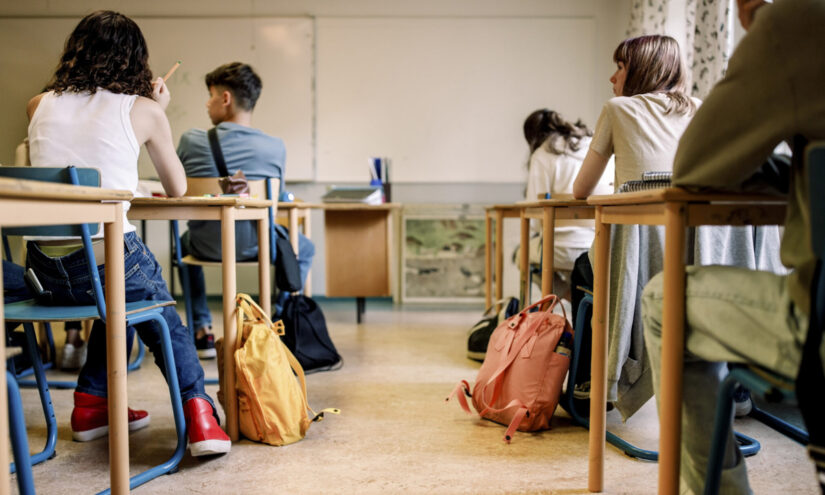During this summer, a team of students from MIT embarked on a journey to the sou …
Utah Bill Proposes Politically Neutral Teaching Requirement
Jennifer Livingstone

This bill initially emerged as what critics have dubbed a “Don’t Say Gay” proposal last year and has since transformed into more extensive legislation aimed at regulating the language and displays allowed within educators’ classrooms.
HB303, introduced by Rep. Jeff Stenquist, R-Draper, seeks to prohibit teachers from “endorsing, promoting, or disparaging” specific beliefs or viewpoints, including religious, political, and LGBTQ+ perspectives.
About a year ago, Stenquist commenced efforts on the bill following concerns raised by some parents over a teacher engaging young students in discussions about gender identity and pronouns.
Stenquist conveyed his intention to remedy a “perception issue” surrounding teachers and eliminate political and ideological debates within educational settings. The primary objective is to reassure parents that students are shielded from exposure to contentious ideological or political notions, regardless of their affiliations.
However, critics of the bill, including the Utah Education Association and the American Civil Liberties Union of Utah, argue that its ambiguity could deter teachers from openly engaging with students without fear of reprisal.
Despite these reservations, the bill narrowly passed its preliminary legislative review with a 6-5 split vote in the House Education Committee. The next stage for the bill is the House floor.
Objectives of HB303
HB303 seeks to prevent educators or school staff from utilizing their positions to support, promote, or critique specific beliefs through instruction, materials, or displays. It also prohibits them from encouraging students to reconsider or alter their personal beliefs.
The bill delineates the targeted beliefs as:
- Religious, denominational, sectarian, agnostic, or atheistic beliefs or viewpoints
- Political or social beliefs or viewpoints
- Viewpoints on sexual orientation or gender identity
Nonetheless, the bill permits teachers to wear religious attire, such as jewelry reflecting their faith, and exhibit personal family photos within their educational settings.
Teachers retain the ability to broach age-appropriate topics or present images or symbols relevant to the curriculum’s approved content.
Stenquist stated that the bill necessitates the implementation of a standardized policy promoting neutrality in Utah’s school districts.
Debating HB303
While shaping the bill, Stenquist collaborated with Megan Kallas, a concerned parent and constituent, to address what she perceived as inappropriate discussions initiated by her daughter’s first-grade teacher on gender identity and pronouns outside the prescribed curriculum.
Disappointed by the school administration’s inaction due to the absence of definitive policies, Kallas approached Stenquist to draft a measure safeguarding all students and fostering a learning-based environment devoid of ideological impositions.
Advocates of HB303 emphasized the necessity for teacher professionalism and the creation of a politically impartial learning atmosphere.
However, Sara Jones, representing the Utah Education Association, cautioned against the bill, expressing uncertainties regarding its vague language and potential repercussions on educators.
For instance, Jones highlighted the bill’s allowance for teachers to display personal photographs but raised queries about the interpretation of photos relating to politics or sexual orientation.
Voicing concerns about potentially inhibiting open dialogue, Jones pondered how educators could avoid inadvertently influencing students’ political perspectives during lessons on government or history.
She warned that unclear language poses risks for teachers, who may face disciplinary actions or licensing challenges.
Notably, two students endorsed the bill’s objectives during the committee session. One student lamented the presence of “gay pride” flags in classrooms, indicating bias in teaching practices.
Another student echoed similar sentiments, advocating against the introduction of disagreeable symbols or ideologies within educational spaces.
Representatives of conservative associations backed HB303, asserting that it would ensure educational content remains unbiased and neutral.
Conversely, Zee Kilpack, a self-identified transgender individual, criticized the bill, contending that it stifles discussions regarding LGBTQ+ individuals’ existence, a demographic historically marginalized.
Expressing concerns about inclusivity and future readiness, Kilpack contested HB303’s potential impact on LGBTQ+ teachers and their freedom to express personal affiliations without facing repercussions.
During deliberations, Rep. Dan Johnson inquired about teachers feeling excessively monitored under the bill, to which Stenquist acknowledged a probable adjustment for educators who attempt to impose personal beliefs on students.
While acknowledging the inherent challenges in defining neutrality in legislative text, Stenquist welcomed suggestions for refining the bill’s language to enhance clarity and applicability.
Rep. Carol Spackman Moss, a former educator, opposed the bill, contending it could impede teachers’ handling of controversial topics in subjects like history and social studies. She underscored existing school policies that address professional conduct, indicating an implicit trust in educators’ capabilities.
Conversely, Rep. Kera Birkeland fervently supported HB303, rejecting accusations of targeting specific groups and stressing the importance of maintaining respectful classroom environments that prioritize academic growth and mutual understanding.
Emphasizing the need for inclusive classrooms devoid of biased influences, Birkeland advocated for a neutral space where students feel valued and respected regardless of their backgrounds.
However, Rep. Neil Water voiced concerns about potential unintended ramifications of the bill, drawing parallels to recent legislation targeting diversity and inclusion programs in public institutions.
House Majority Whip Karianne Lisonbee lent her support to HB303, lauding the bill’s focus on fundamental academic learning and professional standards designed to benefit all students.
Advocates and opponents of the bill presented contrasting views during the committee session, underscoring the complexities of fostering open dialogue in educational settings while maintaining a balanced and respectful environment.
Utahn Jacob Hancey argued against restricting teachers’ freedom to express diverse viewpoints and engage students in constructive debates, highlighting the transformative power of respectful disagreements in shaping students’ perspectives.
Hancey’s personal experience underscored the value of engaging with differing opinions in an educational setting, ultimately fostering growth and understanding among students.
He urged lawmakers to consider the educational value of reconciling conflicting viewpoints, emphasizing the potential for personal growth that arises from respectful dialogue and debate.

